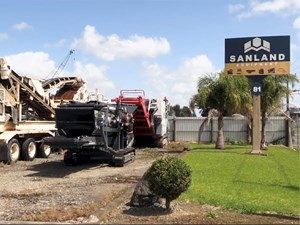Dealing with the economic downturn
The COVID-19 virus has had a significant impact on many sectors of the trucking industry
.jpg)
The downturn in the New Zealand economy driven by the worldwide concerns from the COVID-19 virus has had a significant impact on many sectors of the trucking industry.
New Zealand as a country is heavily dependent on the export/import sectors of the economy, including the export of commodities such as timber, coal, dairy, food, and meat products to overseas markets and the import of goods, food, fuel, raw materials, along with incoming overseas tourists, students, etc. to generate the economic activity that keeps the country going financially.
With less income coming into the economy, businesses are looking to cut costs wherever they can—a case of business survival for many. This, in turn, has a follow-on effect for trucking companies that rely on the wider business sector for their workload.
Less money to go around means less work for trucking companies as businesses cut back on supplies and services that can be deferred to a later date.
Conversations I’ve had with several trucking operators confirm that they are going through tough times as they look to adjust their business to the present circumstances.
In some cases, operators are reporting their workload has dropped by as much as 80%—certainly not a sustainable long-term business position. If your business is facing a downturn and going through some quiet times, then you need to start making some plans to turn things around before it’s too late.
Chances are if your business is quiet, then you have some time on your hands to put aside to review your current business position. Depending on the structure of your business, you should sit down with your business partner or trusted advisor and have a frank discussion.
Doing a SWOT analysis is a good first step. Take an overall look at your business strengths, weaknesses, opportunities, and threats. Take a hard look at your current business environment and ask some questions.
What’s happening in your sector? Is it going well or are there further lean times ahead? Is it likely to improve in the short term or are the problems longer term? How are your competitors handling the situation?
Getting the answers to these questions will help you to understand your current business environment and put you in a better position to make the right decisions for your business.
As part of this process, review your business’ current financial position and prepare a Statement of Position. This should include all aspects of your business, including outstanding debts, income, assets, and all liabilities.
If you’re an owner-operator business, this Statement of Position should consider your personal situation as well. Can you reduce any unnecessary costs in your business? Now is the time to review all your expenses.
At NZ Trucking Association, we have a number of discount purchasing schemes, including fuel, oil, tyres, and insurance. These help our members to reduce costs on everyday purchases. It may be worth giving us a call to see if we can save you from some unnecessary expenses.
Your business debt structure should be reviewed to ensure that you’re taking advantage of the historically low interest rates that are available at present. This measure alone could potentially save you thousands of dollars per year in interest charges.
It may be worth considering restructuring and consolidating your existing loans to get more favourable terms. If you have a short-term cash flow problem, your lender may consider giving you an interest only loan facility while you get your business in order.
Poor cash flow has sunk many a good business over the years. You need to review and chase up any outstanding creditors; you’re providing a trucking business service, not a free credit banking service.
If you have clients who are slow at paying, or worse still not paying at all, then you need to stop extending them free credit. If they are regularly late with their payments, then send them down the road and let someone else worry about them. With the tight margins in this industry, you cannot afford to keep them as clients.
Review your capital assets and your employment requirements. If your business is suffering a downturn, and there’s not enough work to justify all your capital assets and the number of employees that your business has, then you need to look at the alternatives.
Can these assets and employees be redeployed elsewhere in your business, or hired out to another business to await busier times, or do you need to consider selling some of these assets and letting go of some employees to keep the business viable.
Are your rates sustainable? If you understand the true costs of running your business, you will know the answer to this question. If you’re not sure how to accurately work this out, contact the NZ Trucking Association.
We would be happy to help you analyse your cost structures to get an accurate picture of your situation. Unfortunately, in this industry, too many trucking operators are surviving on ridiculously low profit margins. The current industry average is a one percent return on capital. Why would you bother if this was your long-term business situation?
Once you’ve completed a review of your business and put the plans in place to ensure that your business is in a financially viable position, it’s important that you regularly review your business performance to take account of any further changes in the sector that business operates.
If your business is struggling and you would like some help along the road to recovery, then contact the NZ Trucking Association on 0800 338 338 or info@nztruckingassn.co.nz. Our team has the skills and experience to help you and your business along the road to success.
Keep up to date in the industry by signing up to Deals on Wheels' free newsletter or liking us on Facebook.





.jpg)


.jpg)


.jpg)

.jpg)



